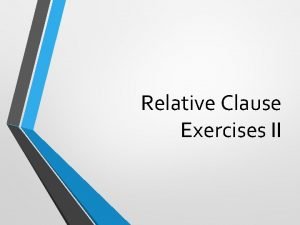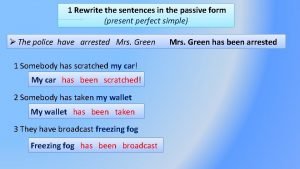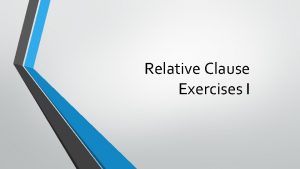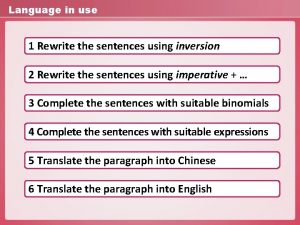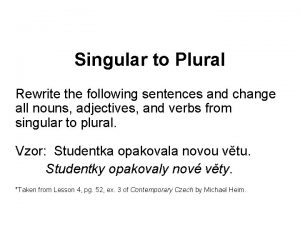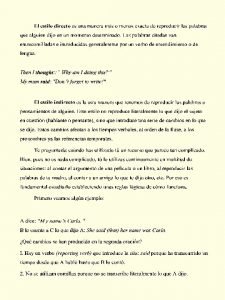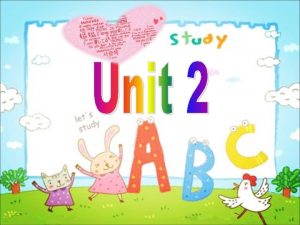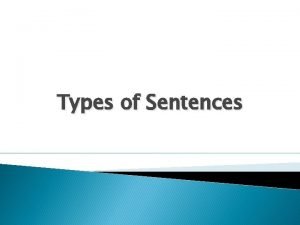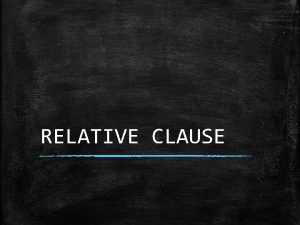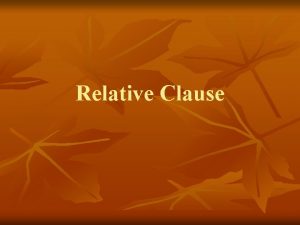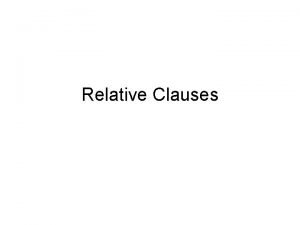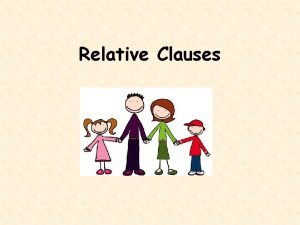Relative Clause Exercises II Rewrite the following sentences









- Slides: 9

Relative Clause Exercises II

Rewrite the following sentences forming a relative clause from the second sentence and substituting who, whom, whose, which, or that for the appropriate noun or noun phrase in the second sentence. 1. A student always answers the teacher’s questions first. The student sits in the middle of the front row. A student who sits in the middle of the front row always answers the teacher’s questions first. 2. The doctor has his office in a medical center nearby. The doctor lives next door. The doctor who lives next door has his office in a medical center nearby.

3. New York City is not the capital of the state of New York City is surely the most well-known city in the state. New York City , which is surely the most well-known city in the state, is not the capital of the state of New York. 4. Webster’s Third New International Dictionary attracted a great deal of attention in the English-speaking world. Webster’s Third New International Dictionary was published in 1961. Webster’s Third New International Dictionary , which was published in 1961 , attracted a great deal of attention in the English-speaking world.

5. I cannot remember the title or the author of the book. I was going to recommend the book to you. I cannot remember the title or the author of the book that/which/X I was going to recommend to you. 6. My aunt is coming to visit Jane is very fond of my aunt. My aunt whom Jane is very fond of is coming to visit her. 7. Jane’s mother is coming to visit her. Jane sees her often. Jane’s mother , who/whom Jane sees often , is coming to visit her.

8. Will the person please move his car? The person’s car is in the driveway. Will the person whose car is in the driveway please move his car? 9. Tomorrow we will climb a mountain. The peak of the mountain is covered with snow. Tomorrow we will climb a mountain the peak of which is covered with snow. 10. Tomorrow we will climb a mountain. The mountain’s peak is covered with snow. Tomorrow we will climb a mountain whose peak is covered with snow. 11. Jane Austen was born in England in 1775 and lived there until her death in 1817. I have always enjoyed Jane Austen’s works. Jane Austen , whose works I have always enjoyed , was born in England in 1775 and lived there until her death in 1817.

Join the sentences by changing the second sentence of each pair into a defining relative clause. Omit the relative pronoun if the relative pronoun is NOT the SUBJECT of the clause. 1. The exhibition was not very interesting. My friend took me to see it. The exhibition my friend took me to see was not very interesting. 2. One of the main things is to save money, manpower, and time. A computer can do this thing. One of the main things a computer can do is to save money, manpower, and time. 3. The car was driven by the world champion. It won the race. The car which / that won the race was driven by the world champion.

4. Trade Union legislation is one major problem. The Government has to deal with this problem. Trade Union legislation is one major problem the Government has to deal with. 5. Immigration is an issue. This issue raises strong emotions. Immigration is an issue which raises strong emotions. 6. The yacht arrived first. It started last. The yacht which / that started last arrived first. 7. There is evidence that many men were in fact willing to accept the Company’s revised pay offer. These men went on strike. There is evidence that many men who / that went on strike were in fact willing to accept the Company’s revised pay offer.

8. Is the offer still open? You made the offer last week. Is the offer you made last week still open? 9. The gales caused widespread damage. They swept across southern England last night. The gales which / that swept across southern England last night caused widespread damage. 10. Paintings by Renoir received record prices in the sale. The sale took place at Sotheby’s in London yesterday. Paintings by Renoir received record prices in the sale which / that took place at Sotheby’s in London yesterday.

The exercises are compiled from; . B. D. Graver. Advanced English Practice, 14 th Ed. Oxford University Press. 2000. . Cook, Mary Jane. Trouble Spots of English Grammar: A Text-Workbook For ESL. Volume I. & Volume II. New. York: Harcourt Brace Jovanovich, Inc. 1983. . L. G. Alexander. Longman Advanced Reference and Practice. 3 rd Ed. Longman. 1993. . Thomson, A. J. , and A. V. Martinet. 1999. A Practical English Grammar. 14 th Ed. Oxford: Oxford University Press, 1999.
 Relative clause rewrite exercise
Relative clause rewrite exercise Rewrite the sentences in the passive in which sentences
Rewrite the sentences in the passive in which sentences Relative clause practice
Relative clause practice Rewrite the following sentences using inversion
Rewrite the following sentences using inversion Rewrite sentences from singular to plural
Rewrite sentences from singular to plural Write each of the two sentences below as one sentences
Write each of the two sentences below as one sentences Speaking mathematically
Speaking mathematically Rewrite the statements as reported speech
Rewrite the statements as reported speech Rewrite the sentences in passive voice
Rewrite the sentences in passive voice Rewrite the following sentence in the passive voice
Rewrite the following sentence in the passive voice
